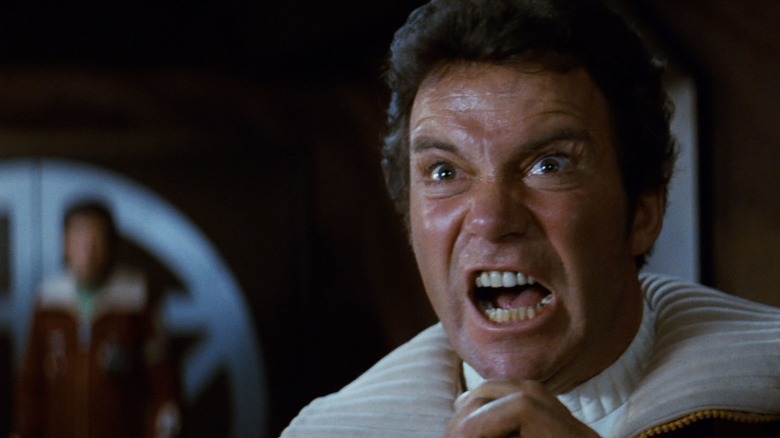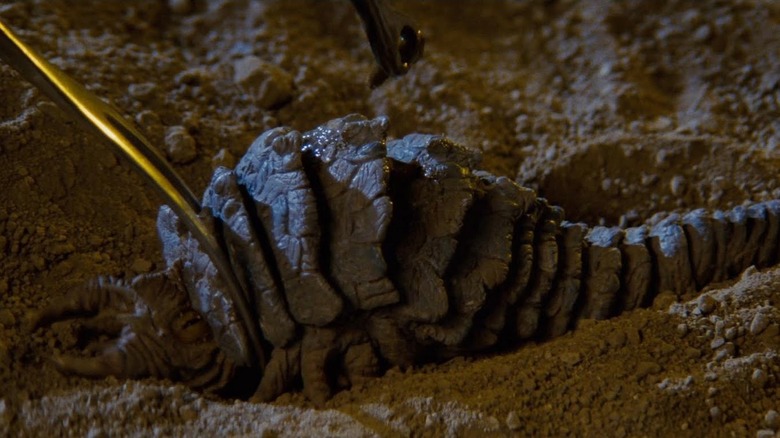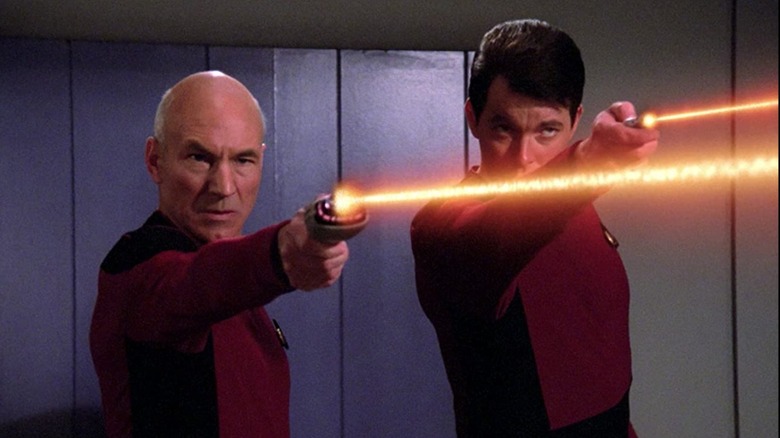Gene Roddenberry Wasn't Happy With Star Trek: Wrath Of Khan's Most Famous Scene
When Gene Roddenberry first pitched "Star Trek," he sold it as "Wagon Train" to the stars, a reference to the long-running 1957 western TV series. Roddenberry wanted the show to be about bold frontiersmanship and cultural exchange but with the bonus of being expressly anti-colonialist. "Star Trek's" famed Prime Directive ensured that no ultra-advanced civilization would be permitted to enforce their will on another culture. Roddenberry also wanted to ensure that his vision of the future was without prejudice (he asked for a multicultural cast) and beyond religion (he rejected a studio note to include a chaplain on the Enterprise).
After "Star Trek" was canceled in 1969, it fell into syndication with reruns broadcast all over the country. Thanks to its sudden ubiquity, "Star Trek" began amassing a cult in the early 1970s and Trekkies began to form their own identity as a fan group. In January of 1972, in New York City, the first "Star Trek" convention was held. Throughout the 1970s, Trek conventions became a common gathering site for Trekkies and Trek actors alike, with the cast often appearing in person to talk about their experiences on the show. Gene Roddenberry, of course, would also frequently attend conventions as well as go on speaking tours to discuss both the technical details of his show and his operational philosophy going in.
It wasn't until these speaking tours that Roddenberry's modern vision of "Star Trek" would solidify. What was once a frontier-based adventure show with a multicultural backdrop would slowly transform — in retrospect — into something more akin to a utopia. Roddenberry began preaching a form of "Star Trek" gospel, foretelling a future of gentleness, diplomacy, and a friendly relationship with technology. The future was going to be a bright place where no one argued, no one killed, and where war was at an end.
Roddenberry's newly intensified philosophy of extreme pacifism led to several complaints about the script for "Star Trek II: The Wrath of Khan," credited to Jack B. Sowards from a story by Sowards and Harve Bennett ("Khan's" director Nicholas Meyer rewrote the script, but is not credited). Roddenberry hated the scene where Kirk (William Shatner) kills a Ceti eel that had been living in Chekov's (Walter Koenig) brain, and more so, hated that Spock (Leonard Nimoy) was to die at the film's conclusion.
The Ceti eel
For the uninitiated, a Ceti eel is a ridged, pincer-sporting sand creature that Khan (Ricardo Montalbán) harvests while stranded on the desert planet Ceti Alpha V. The eel's young —little tiny leech monsters — could be placed in a human ear and would burrow into the brain, making one placid and susceptible to suggestion. Khan used this technique to pacify Captain Terrell (Paul Winfield) and Chekov (Walter Koenig) to steal a starship, escape into space, and enact revenge on Admiral Kirk (William Shatner). Later in the film, the eels come back when Terrell and Chekov — now sweaty and half-mad from the eels' influence — hold Kirk at phaserpoint. Terrell doesn't make it, but Chekov faints, collapsing to the floor. In a discharge of blood, Chekov's brain eel, exits his ear and begins crawling away. Kirk, disgusted by the creature, draws his phaser and kills it.
The hosts the "Inglorious Treksperts" podcast, Mark A. Altman and Daren Dochterman, revealed in an interview with SyFy, that Gene Roddenberry hated that scene. Altman and Dochterman said that the script for "Khan" went through several drafts and that the Ceti eel was always a part of the story, but it wasn't until Nicholas Meyer was doing re-writes — what Altman called "playing 'Mad Libs' and connecting all the previous drafts" — that Kirk was to kill it. "It was something that Gene Roddenberry really hated, when Kirk phasers and destroys the Ceti eel after crawling out of Chekov's ear, because ... well, Daren what would he say?"
Dochterman, doing a Roddenberry impersonation, said "We don't destroy life. The "Star Trek" characters would not go out of their way to destroy a life form, no matter what it would do."
Altman then acknowledged that Roddenberry, by the early '80s, had become a self-styled guru about "Star Trek":
"But he started drinking his own publicity at that point, and believed all this stuff. After he'd been replaced by Harve Bennett, he had a lot of quibbles and problems with 'Star Trek II,' the most famous of course being that Spock would die, and [he] was the one who leaked that fact to the newspapers and to the fans to try and prevent that from happening."
The Next Generation
There was a lot of trepidation going into "Star Trek II." The lackluster financial performance of "Star Trek: The Motion Picture" in 1979 caused Paramount to remove Roddenberry from the sequel altogether, replacing him with Harve Bennett. Roddenberry wouldn't be closely involved in any future "Star Trek" films. Indeed, Paramount was looking to scuttle "Star Trek" altogether, having little faith that "Star Trek II" would fetch high grosses. Even actor Leonard Nimoy only agreed to do another feature film if his character was killed off.
Nicholas Meyer came in, re-wrote the script, and directed a film that was more reminiscent of "Horatio Hornblower" than "Star Trek" and, as popular wisdom has it, saved the franchise. Additional films would be made as a result, and Nimoy would even return under the condition that he also be allowed to direct. "Star Trek III: The Search for Spock" and "Star Trek IV: The Voyage Home" were both directed by Nimoy, with "Voyage Home" becoming the biggest hit in the film series. Meyer, not incidentally, co-wrote the screenplay for "Voyage Home." Meyer would also direct "Star Trek VI: The Undiscovered Country," one of the better films in the series. Meyer has said in interviews that he saved "Star Trek," and he wrote a book about his involvement in the franchise.
Meanwhile, Gene Roddenberry had a vision to protect. He took his ideas of a pure future without conflict and manifested them as "Star Trek: The Next Generation" in 1986. Roddenberry would have to wrestle with the higher-ups at Paramount TV to get "Next Generation" to the small screen, and he infamously became something of a dictator during that show's first season. The drama of that first season is well documented, but it was important to Roddenberry to get "Star Trek" right this time. The ballyhooed "Roddenberry rule" dictated that, on this new "Star Trek," no stories may spring from interpersonal conflicts. All conflicts come from without, as the Enterprise crew is wise enough to get along professionally at all times. This was a show wherein no one is to kill an alien parasite just because it looks weird or took over someone else's body.
When Roddenberry took leave of "Next Generation," the show — in what feels like a massive middle finger to Gene — had Captain Picard (Patrick Stewart) do just that. The future may be peaceful and without conflict, and all life may have value, but when it comes to slimy alien brain parasites, better to blast them. Sorry, Gene.


